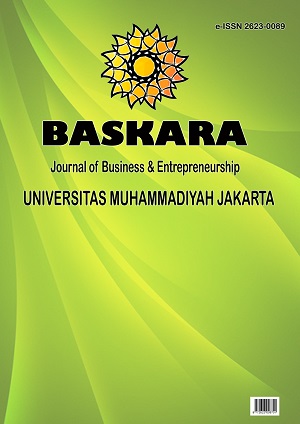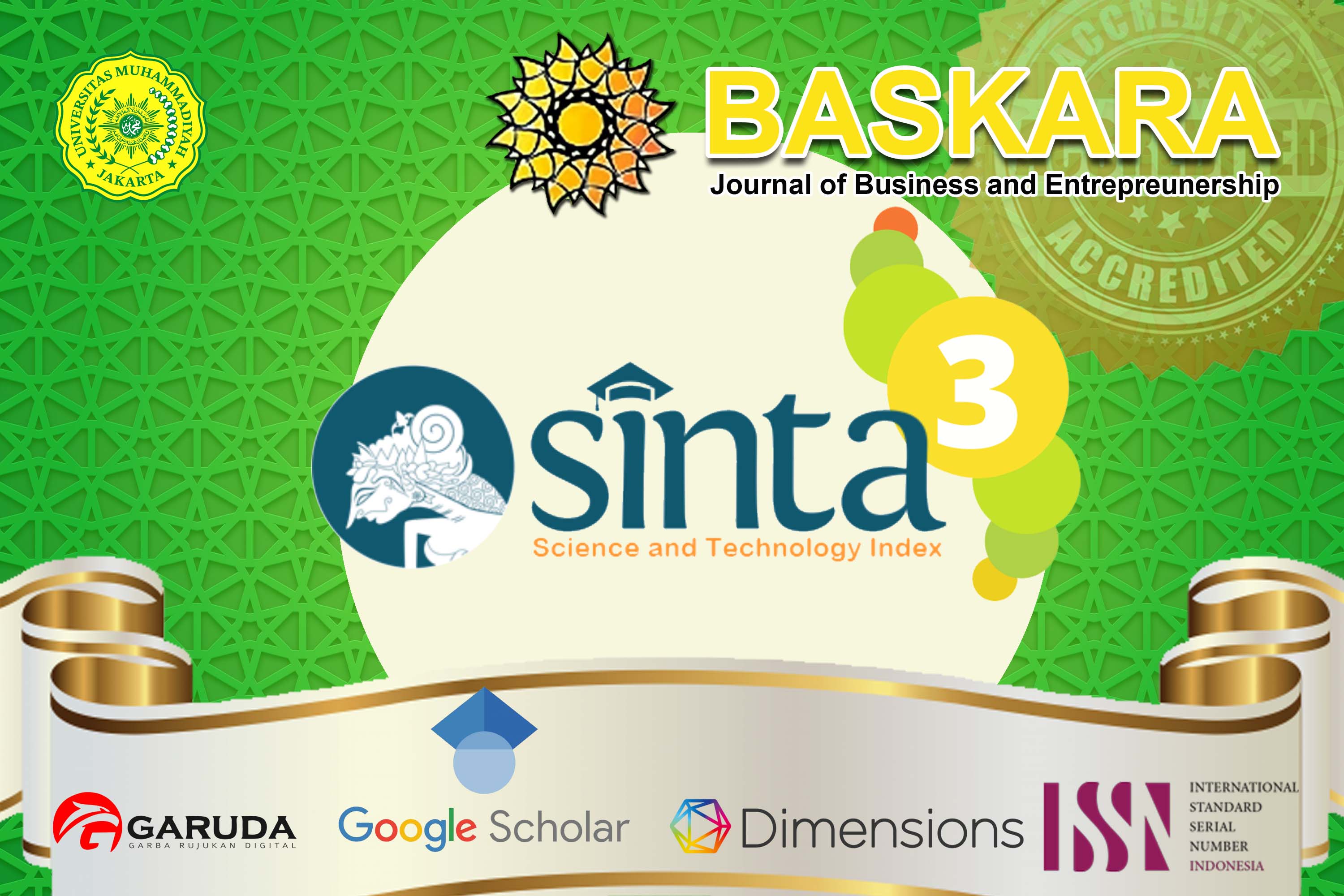Pancasila Implementation Strategy as Dar al-ahdi wa al-syahadah
DOI:
https://doi.org/10.54268/baskara.v4i2.12498Kata Kunci:
Dār Al-Ahdi Wa Al-Syahādah, Pancasila, “The Middle Way”Abstrak
Pancasila has become an agreement as to the final form of state philosophy or ideology. Pancasila is considered a "middle way". Muhammadiyah, as an important actor in the process of formulating Pancasila, feels it is important to maintain Pancasila as the basis of the state. At the 47th Muhammadiyah congress in Makassar, 2015, Muhammadiyah decided to make Pancasila as Dār Al-Ahdi Wa Al-Syahādah. This paper examines the Pancasila Implementation Strategy as Dār Al-Ahdi Wa Al-Syahādah to provide solutions to the ideological and practical problems of Pancasila. There are many challenges facing Pancasila. Some are ideological and some are practical. The ideological challenges are relatively reduced as a result of the commitment of Islamic organizations such as Muhammadiyah to Pancasila. On the other hand, the practical challenges related to the implementation of Pancasila are even greater. For example, Pancasila has played a role in Indonesian economic policies in dealing with COVID-19, business monopolies and oligarchs, and eradicating corruption?. This study uses the Literature Review method for meta-analysis of data by reviewing several articles in national and international journals. The conclusion is that the Pancasila problem is more related to the implementation of the values contained in the Pancasila precepts. The very great values of Pancasila are not able to colour the life of the nation and state.Referensi
A.H. Nasution, Sekitar Perang Kemerdekaan Indonesia, Jilid 1 Proklamasi, Bandung: Angkasa, 1977
Al-Barbasy, Ma’mun Murod, Ambiguitas Politik Kaum Santri, Jakarta: Grafindo, 2015.
--------, Politik perda Syariah dialektika Islam dan Pancasila di Indonesia, Yogyakarta: Suara Muhammadiyah, 2018.
--------, Hidup Itu Berjuang: Kasman Singodimedjo Ke-116 Tahun, Jakarta: PSIP UMJ-Fraksi PAN MPR RI, 2020.
Anshari, Endang Saefuddin, Piagam Jakarta 22 Juni 1945: Sebuah Konsensus Nasional tentang Dasar Negara Republik Indonesia (1945-1949), Jakarta: Gema Insani Press, 1977.
Boland, BJ., Pergumulan Islam di Indonesia 1945-1970, Jakarta: Grafiti Press, 1985.
Budiyanto, Gunawan, dkk. (Ed.), Konstruksi Pemikiran Politik Ki Bagus Hasikusumo: Islam, Pancasila, dan Negara, Yogyakarta: Universitas Muhammadiyah Yogyakarta, 2018.
Harun, Lukman, Muhammadiyah dan Asas Pancasila, Jakarta: Pustaka Panjimas, 1986.
Maarif, Ahmad Syafii, Islam dan Masalah Kenegaraan: Studi tentang Percaturan dalam Konstituante, Jakarta: LP3ES, 1984
Nasution, Adnan Buyung, Aspirasi Pemerintahan Konstitusional di Indonesia. Studi Sosio-Legal atas Konstituante 1956-1959, Jakarta: Pustaka Grafiti Utama, 2001
Noer, Deliar, Islam, Pancasila dan Asas Tunggal, Jakarta, Yayasan Perhidmatan, 1984
--------, Partai Islam di Pentas Nasional, Jakarta: Pustaka Utama Grafiti, 1987.
Notonagoro, Beberapa Hal Mengenai Falsafah Pancasila, 1984.
Notonagoro, Pancasila Secara Ilmiah Populer, Jakarta: Pantjuran Tujuh, 1975
Pour, Julius, Doorstoot Naar Djokja Pertikaian Pemimpin Sipil-Militer, Jakarta: Kompas, 2009.
PP. Muhammadiyah, Sejarah Muhammadiyah, Yogyakarta: Majelis Pustaka PP. Muhammadiyah, 1995
Saifullah, Gerak Politik Muhammadiyah dalam Masyumi, Jakarta: Grafiti Press, 1997
Saleh, Hasanuddin M., HMI dan Rekayasa Asas Tunggal Pancasila, Yogyakarta: Kelompok Studi Lingkaran, 1996.
Sitompul, Einar Martahan, Nahdlatul Ulama dan Pancasila, Jakarta:
Sinar Harapan, 1986.
Soekarno, Demokrasi Terpimpin, Milik Rakyat Indonesia: Kumpulan Pidato, Jakarta: Gramedia, 2001.
Suryanegara, Ahmad Mansur, Api Sejarah 2, Bandung: Penerbit Surya Dinasti, 2015
Thaba, Abdul Aziz, Islam dan Negara dalam Politik Orde Baru, Jakarta: Gema Insani Press, 1996
Al-Barbasy, Ma’mun Murod, “Islam dan Negara: Perdebatan dalam Pembuatan Perda Syariat di Kota Tasikmalaya”, Afkaruna, Volume 12 Nomor 2, 2016.
-------, “Muhammadiyah dan Politik: Dilema Antara Keep Close dan Keep Distance”, Kontekstualita: Jurnal Penelitian Sosial dan Keagamaan, Vol. 34 No. 2, Desember 2017
Al-Hamdi, Ridho, “The Jakarta Charter In Post-Soeharto Indonesia: Political Thoughts Of The Elites In Muhammadiyah”, Masyarakat Indonesia, Vol. 41 (1), Juni 2015.
Hidayat, Syamsul, “Pancasila sebagai Darul Ahdi Wa al-Syahadah: Wawasan dan Kontribusi Muhammadiyah bagi NKRI, Tajdida, Volume 14 Nomor 1 Juni 2016.
Mu’ti, Abdul, Ahmad Najib Burhani, “The limits of religious freedom in Indonesia: with reference to the first pillar Ketuhanan Yang Maha Esa of Pancasila”, Indonesian Journal of Islam and Muslim Societies, Vol. 9, no.1 (2019), pp. 111-134, doi : 10.18326/ijims.v9i1. 111-134
Priatmoko, Sigit, “Pengarusutamaan Nilai-Nilai Islam Moderat Melalui Revitalisasi Pancasila dalam Pendidikan Islam”, Proceedings of Annual Conference for Muslim Scholars, 2018, Series 2, 731–741. http://proceedings.kopertais4.or.id/index.php/ancoms/article/view/175
Singodimedjo, Kasman, “Peran Umat Islam Sekitar 17 Agustus 1845”, dalam Mimbar Ulama, September 1979
Subaidi, “Strengthening Character Education in Indonesia: Implementing Values from Moderate Islam and the Pancasila”, Journal of Social Studies Education Research, 2020:11 (2), 120-132.
Syarif, Mujar Ibnu, Spirit Piagam Jakarta Dalam Undang-Undang Dasar 1945, Jurnal Cita Hukum, Fakultas Syariah dan Hukum UIN Jakarta Vol.4 No.1(2016), pp.15-32, DOI:10.15408/jch.v4i1.3568.2016.4.1.15-32.
Wijayanta, Hanibal, “Islam dan Pancasila: Diskursus BPUPKI Tentang Dasar Negara”, Republika, 1 Januari 2021.
##submission.downloads##
Diterbitkan
Terbitan
Bagian
Lisensi
In order for Baskara: Journal of Business and Entrepreneurship to publish and disseminate research articles, we need publishing rights (transfered from author(s) to publisher). This is determined by a publishing agreement between the Author(s) and Baskara Journal. This agreement deals with the transfer or license of the copyright of publishing to Baskara: Journal of Business and Entrepreneurship, while Authors still retain significant rights to use and share their own published articles. Baskara : Journal of Business and Entrepreneurship supports the need for authors to share, disseminate and maximize the impact of their research and these rights, in any databases.
As a journal Author, you have rights for a large range of uses of your article, including use by your employing institute or company. These Author rights can be exercised without the need to obtain specific permission. Authors publishing in Baskara : Journal of Business and Entrepreneurship have wide rights to use their works for teaching and scholarly purposes without needing to seek permission, including:
- use for classroom teaching by Author or Author's institution and presentation at a meeting or conference and distributing copies to attendees;
- use for internal training by author's company;
- distribution to colleagues for their reseearch use;
- use in a subsequent compilation of the author's works;
- inclusion in a thesis or dissertation;
- reuse of portions or extracts from the article in other works (with full acknowledgement of final article);
- preparation of derivative works (other than commercial purposes) (with full acknowledgement of final article);
- voluntary posting on open web sites operated by author or author’s institution for scholarly purposes.
Copyright Transfer Agreement for Publishing (Publishing Right)
The Authors who submit manuscript has to understand that if accepted for publication, mean that all copyright and publishing right of the article shall be assigned/transferred to Baskara: Journal of Business and Entrepreneurship as assigned publisher.
- CC BY-NC: This license allows reusers to distribute, remix, adapt, and build upon the material in any medium or format for noncommercial purposes only, and only so long as attribution is given to the creator.
It includes the following elements:
BY ![]() – Credit must be given to the creator
– Credit must be given to the creator
NC ![]() – Only noncommercial uses of the work are permitted
– Only noncommercial uses of the work are permitted
Baskara (C) Copyright (2022):
BASKARA: Journal of Business and Entrepreneurship by https://jurnal.umj.ac.id/index.php/baskara
is licensed under a Creative Commons Attribution-NonCommercial 4.0 International License








